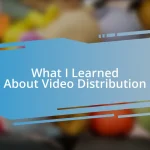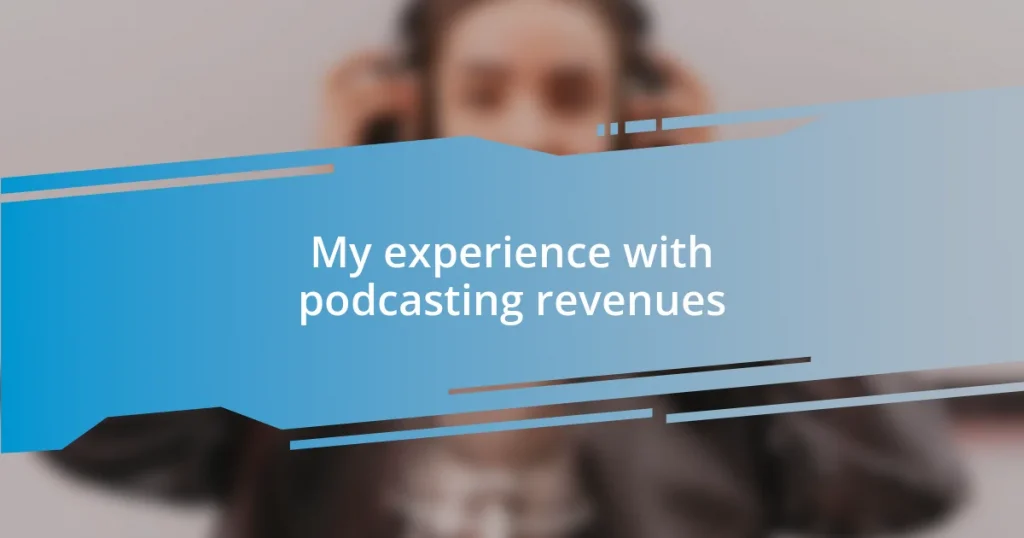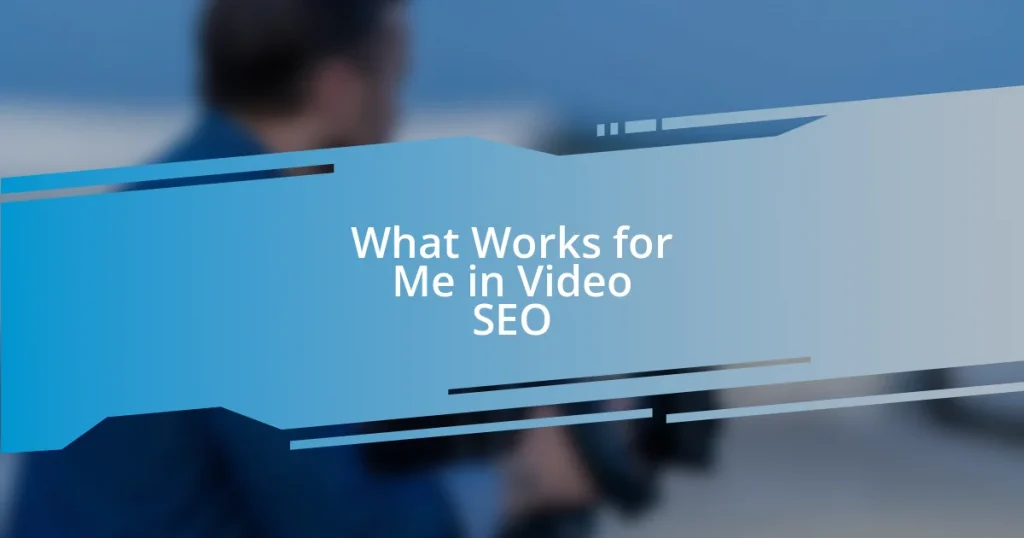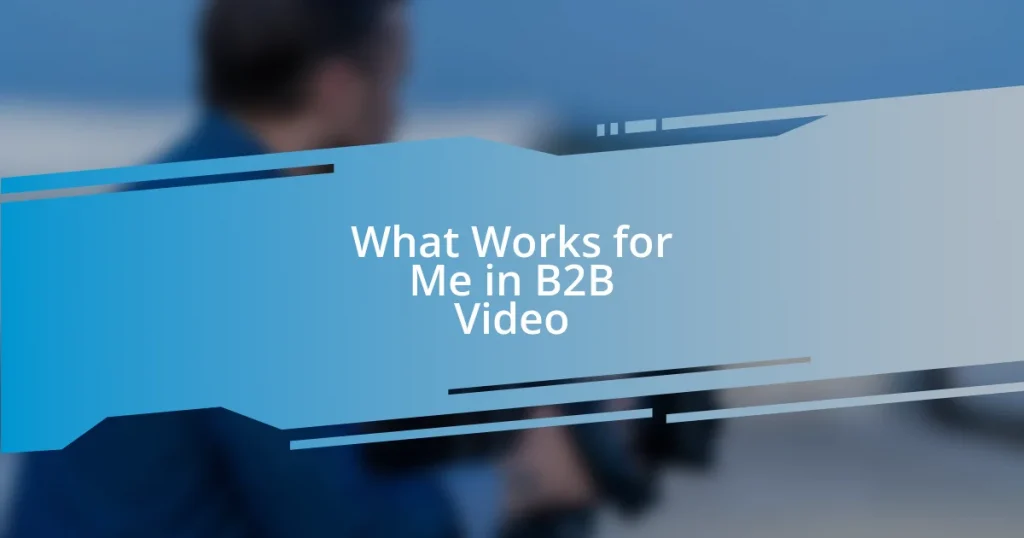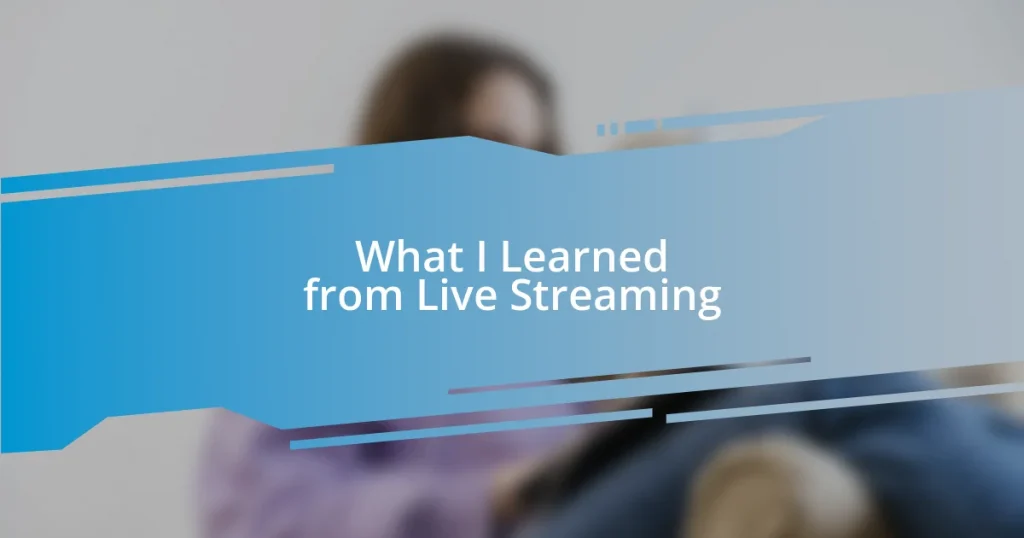Key takeaways:
- Sponsorships align with your content’s values, fostering authentic relationships that enhance listener engagement and revenue.
- Diversifying revenue streams—through strategies like affiliate marketing, merchandise sales, and listener subscriptions—strengthens financial resilience in podcasting.
- Understanding and adapting to audience needs and feedback is crucial for sustainable growth and profitability in podcasting.
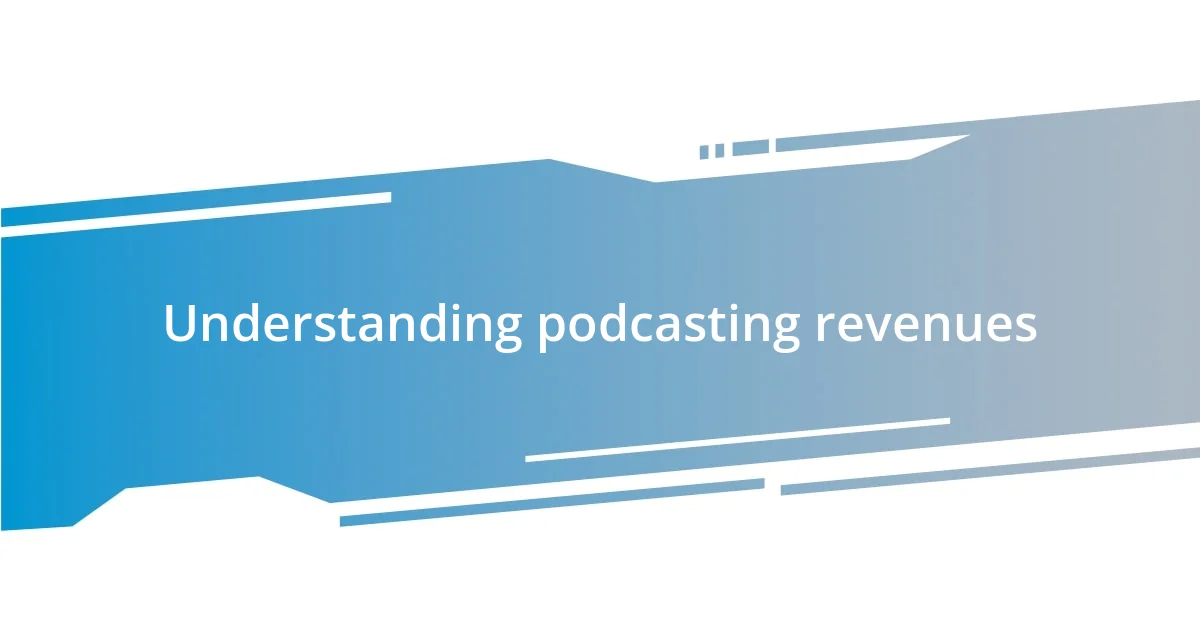
Understanding podcasting revenues
When I first dove into podcasting, I was surprised to discover just how diverse the revenue streams could be. From sponsorships to listener donations, there seemed to be a world of opportunities waiting beyond just the content itself. Have you ever wondered how those big-name podcasts pull in their revenue?
One of my initial encounters with sponsorships was both thrilling and eye-opening. I remember securing my first sponsorship deal; it felt like my hard work had truly paid off. The key here is to find a sponsor whose values align with your content—this creates a genuine connection and resonates with your listeners. It’s not just about the money; it’s about fostering a relationship that feels authentic.
I’ve also explored listener donations through platforms like Patreon, which added a deeply personal dimension to my podcasting journey. There’s something incredibly fulfilling about knowing that your audience values your work enough to support it financially. It makes me reflect—how do we truly measure success in podcasting? For me, it’s not just about the numbers but the community we’ve built along the way.
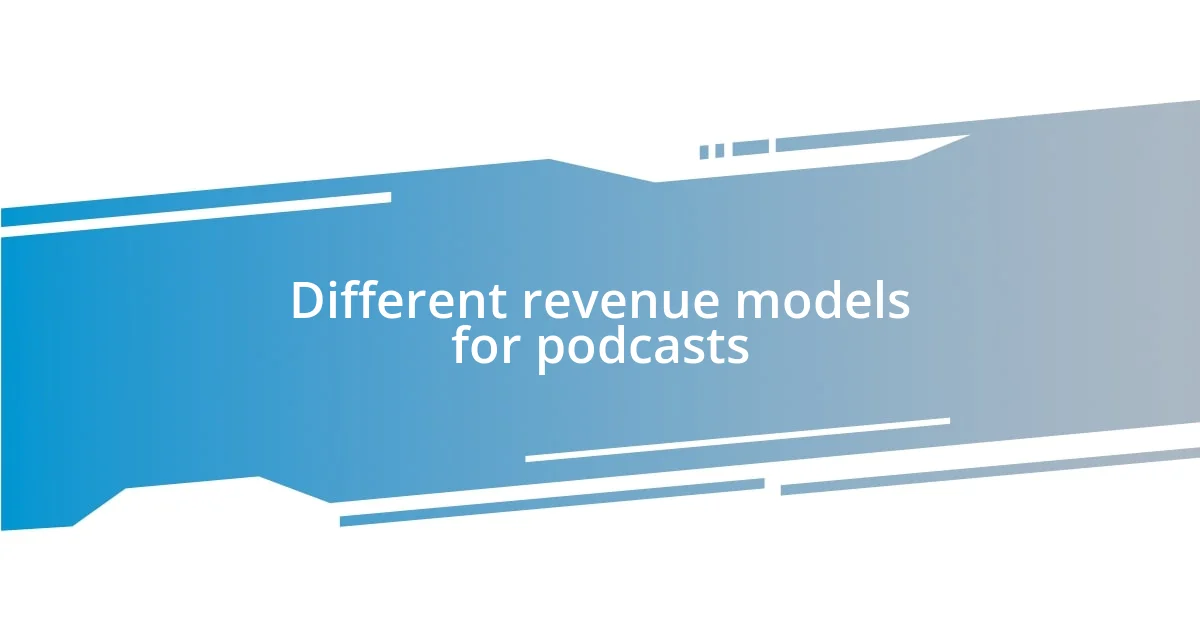
Different revenue models for podcasts
One prominent revenue model in podcasting is sponsorship, which has been incredibly lucrative for many creators. I still remember when I landed a sponsorship with a local brand that aligned perfectly with my podcast’s theme. It felt like a validation of my work. The excitement of promoting their products while staying true to my content created a win-win situation that not only increased my revenue but also enriched my audience’s experience.
Another model I’ve come to appreciate is affiliate marketing. Initially, I was hesitant to dive in, wondering if it would dilute my content. However, after integrating it seamlessly into episodes, I saw how it could genuinely benefit my listeners. For instance, when I recommended a book that had profoundly impacted me, my audience responded positively, and sales through my affiliate link soared. It’s this kind of synergy that I value—where I can offer something useful while earning a commission.
Finally, listener subscriptions, especially through platforms like Patreon, offer a more intimate approach. Personally, I wasn’t sure how my listeners would respond to a subscription model, but the supportive messages I received after launching my tier options were so encouraging. It felt rewarding to receive direct support from my community. This model not only boosts income but also fosters a deeper connection between creators and audience, reinforcing a sense of belonging.
| Revenue Model | Description |
|---|---|
| Sponsorship | Securing deals with brands that align with your content to promote their products or services. |
| Affiliate Marketing | Recommending products and earning a commission on sales generated through your unique links. |
| Listener Subscriptions | Offering exclusive content or perks to audiences who financially support via platforms like Patreon. |
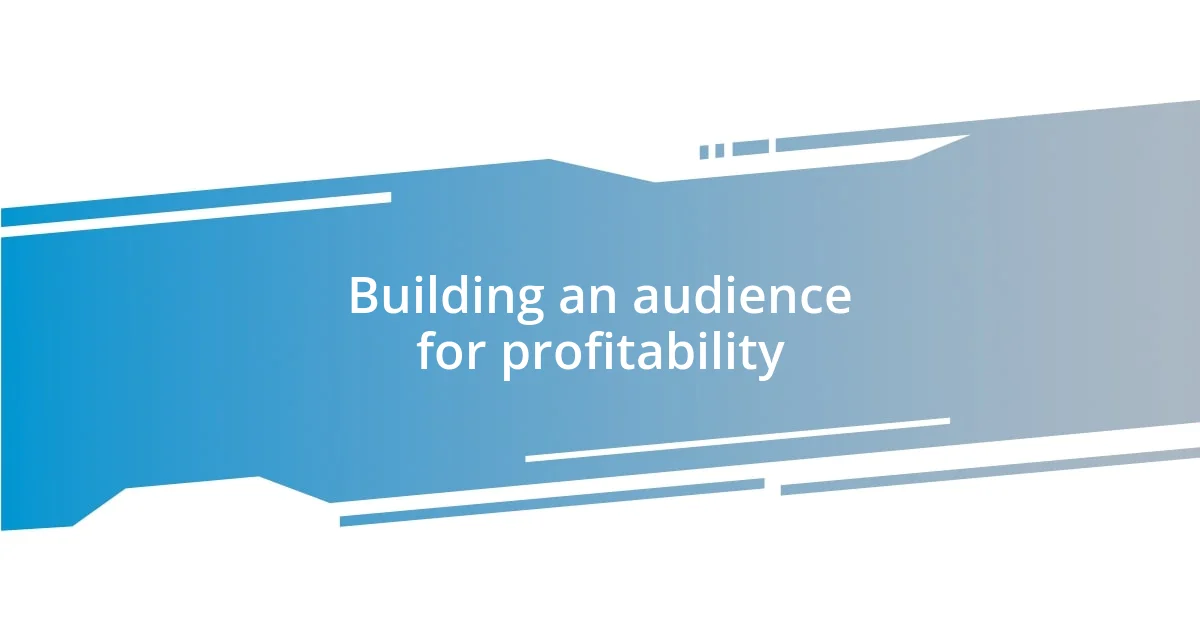
Building an audience for profitability
Building an audience for profitability requires a strategic approach, where understanding your listener’s needs takes center stage. In my experience, the more I tailored my content to what my audience truly craved, the more they became loyal supporters. I remember hosting a Q&A episode after noticing how engaged my listeners were on social media. Their questions and feedback sparked ideas for future topics, which dramatically enhanced my connection with them. This interaction not only deepened their investment in my podcast but also laid the groundwork for greater profitability.
- Create engaging content that resonates with your audience’s interests.
- Foster community through interactive sessions and feedback mechanisms.
- Utilize social media platforms to promote discussions and sneak peeks of upcoming episodes.
- Collaborate with other creators to tap into their audience and expand your reach.
- Regularly analyze feedback to refine and evolve your podcast for sustained engagement.
Investing time in audience engagement isn’t just about building listener numbers; it’s about creating a supportive network that genuinely appreciates your work. One poignant moment for me was receiving a heartfelt message from a listener who shared how my podcast had helped them through a difficult time. That experience solidified my understanding that profitability stems from the authentic relationships you forge with your listeners, which often translates into higher engagement and, ultimately, increased revenue.
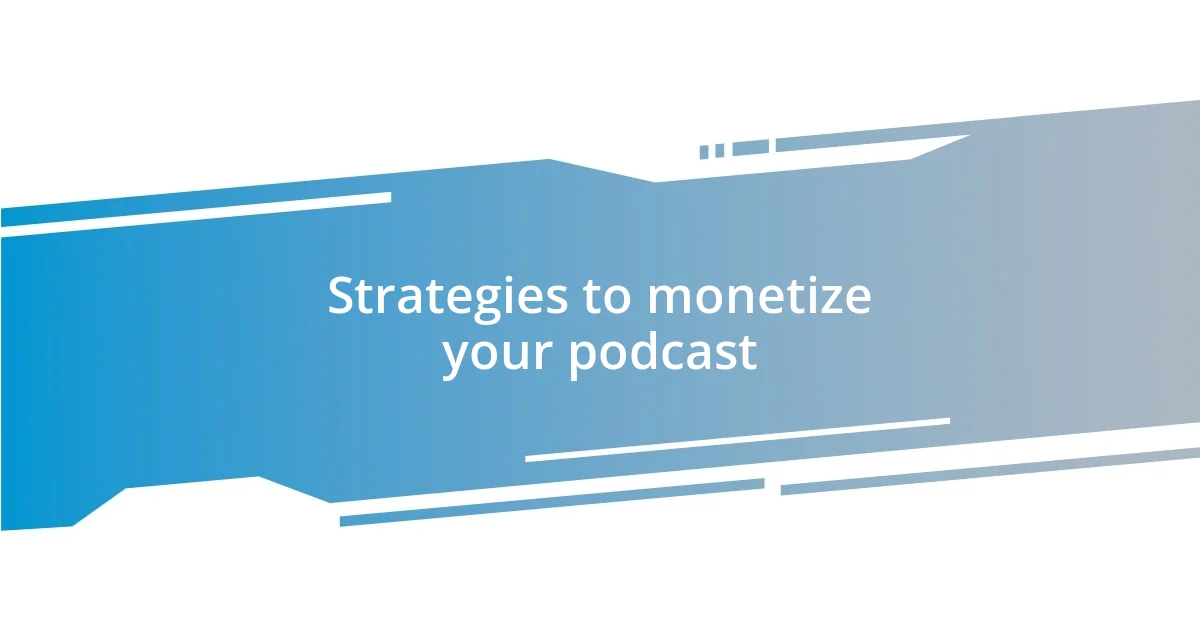
Strategies to monetize your podcast
Exploring merchandise sales was a game changer for my podcast. I launched a line of themed products, such as mugs and T-shirts, which not only resonated with my content but also gave listeners a tangible way to show their support. I’ll never forget the feeling of seeing someone sipping from a mug with my podcast logo—it was a thrilling moment that reinforced the community we were building together.
Crowdsourcing is another strategy that surprised me. Engaging my audience to help fund specific projects often sparked excitement and participation. During a campaign for a live recording, it was not just about the money; it was about the shared passion and commitment we cultivated. I remember the thrill of surpassing our funding goal, which solidified the notion that my listeners were genuinely invested in the journey we were on.
Lastly, hosting live events can take your podcast monetization to another level. When I arranged a live show, the energy in the room was palpable. Seeing my listeners laughing and connecting with each other added an emotional layer to our relationship. Once I recognized the power of these shared experiences, I realized that every ticket sold wasn’t just revenue; it was a celebration of our podcast’s community. Have you considered what kind of live event would excite your own audience? It might just spark a new wave of engagement and income for your podcast.
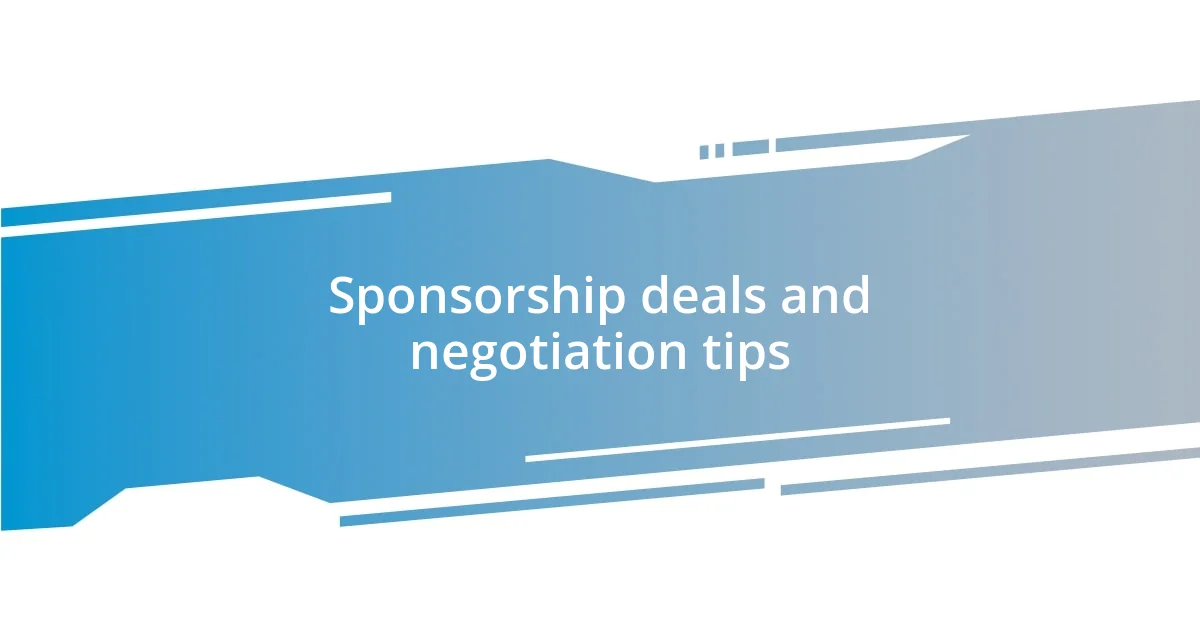
Sponsorship deals and negotiation tips
Securing sponsorship deals can feel daunting, but I’ve found that a personalized approach can make a world of difference. When I first reached out to potential sponsors, I crafted tailored proposals that highlighted how my podcast aligned with their brand values. This not only showed my genuine interest in partnering but also made it easier for them to see the benefits of collaborating. Have you thought about how your podcast can create value for a sponsor? It’s worth reflecting on.
Negotiation is another crucial element that can often intimidate podcasters. In one of my initial negotiations, I was so eager to seal the deal that I overlooked the importance of valuing my own worth. Realizing that I had something unique to offer significantly changed the conversation. I began to learn the art of balance; presenting my metrics confidently while remaining open to the sponsor’s needs. When did you last advocate for your worth? Remember, this is as much about building a partnership as it is about compensation.
Lastly, I learned that flexibility in negotiations can lead to lucrative long-term relationships. One of my most fruitful sponsorships evolved from a modest initial agreement into an ongoing collaboration. I was willing to adapt and brainstorm creative ways to integrate the sponsor’s message without compromising my podcast’s integrity. It was a win-win situation that deepened our connection. Have you explored how flexibility could enhance your sponsorship discussions? Often, the best deals come from a willingness to listen and innovate.
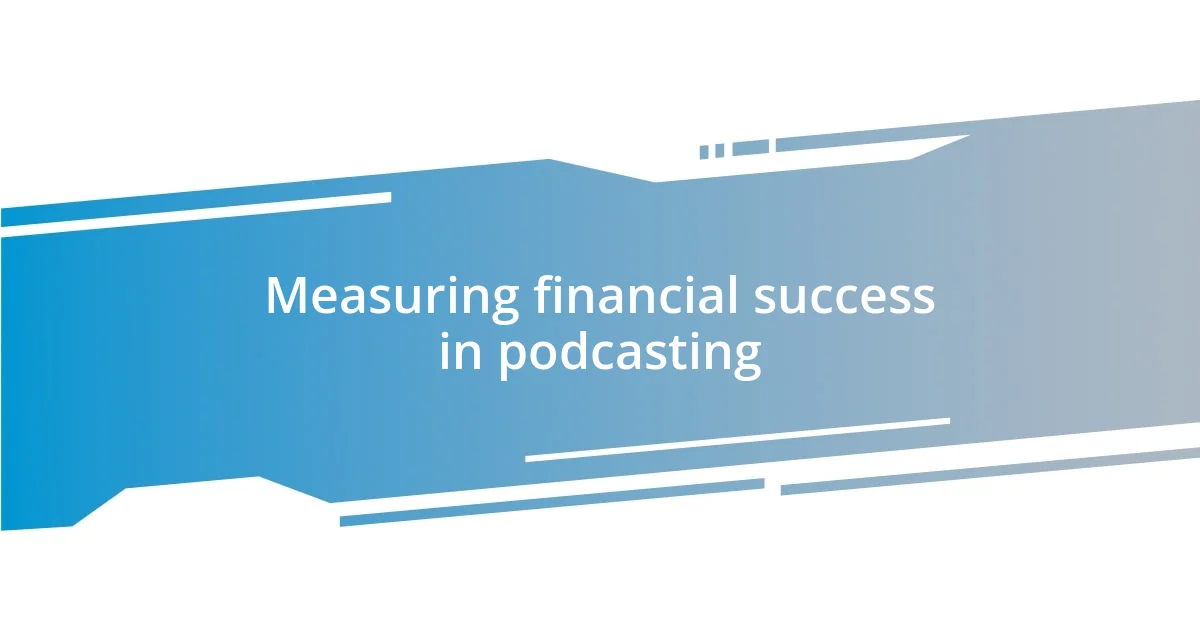
Measuring financial success in podcasting
Measuring financial success in podcasting is not just about crunching numbers; it involves understanding your audience and their engagement. I remember a moment when I compared my download statistics with shopping cart conversions from merchandise sales. It was eye-opening to see how dedicated listeners turned into buyers. This connection between analytics and actual revenue painted a clearer picture of my podcast’s financial health.
One effective approach I’ve employed is tracking multiple revenue streams, not just sponsorships or ad revenue. I started setting short-term financial goals—like aiming for a specific dollar amount from listener donations in a quarter. Achieving those goals fueled my motivation, and I often felt a sense of accomplishment with each milestone, reinforcing my belief in the podcast’s potential. Have you tried breaking down your overall revenue into smaller, manageable targets? It turns this intimidating task into a series of achievable wins.
Moreover, listener feedback provides invaluable context to understanding financial success. After implementing a new tier in my subscription model, I solicited listener opinions and saw both excitement and constructive criticism. This level of engagement affirmed that my audience valued the deeper connection and exclusive content, influencing my revenue positively. How do you gather feedback from your audience? It might hold the key to unlocking new financial opportunities for your podcast.
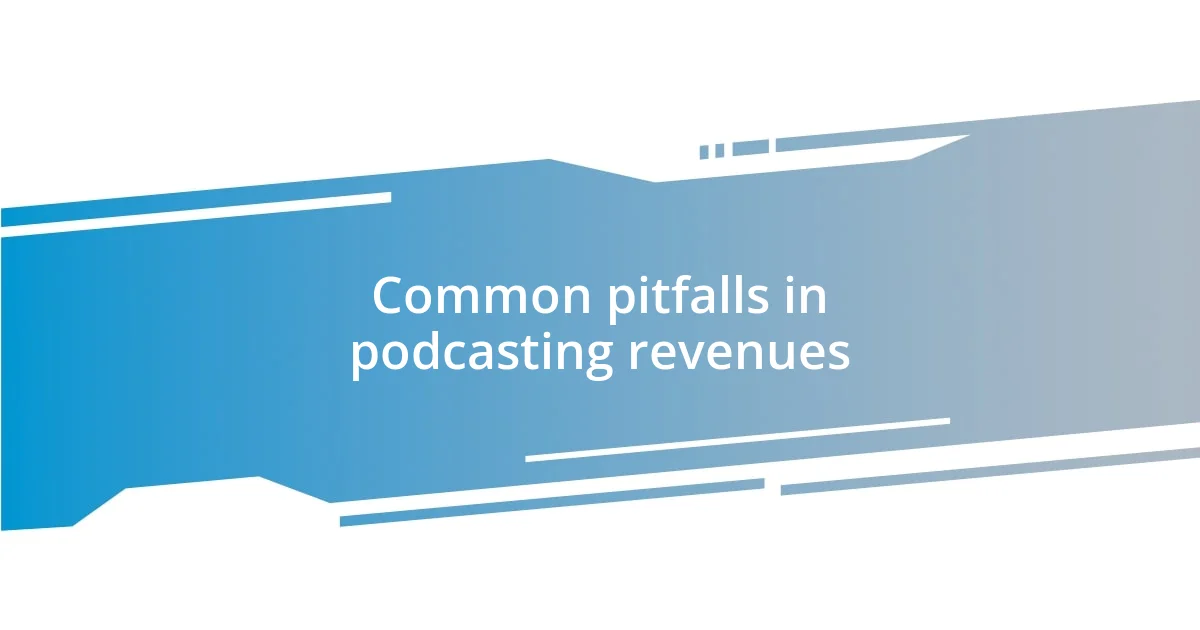
Common pitfalls in podcasting revenues
One common pitfall I’ve encountered relates to the overreliance on a single revenue stream. When I first began podcasting, most of my income came solely from sponsorships. I soon realized that this approach left me vulnerable, especially if a sponsor decided to pull out or reduce their budget. Have you considered diversifying your income sources? It’s essential to explore options like listener donations, merchandise sales, and affiliate marketing to bolster your financial resilience.
Another mistake some podcasters make is neglecting their audience’s needs when monetizing content. I once launched a subscription-only episode that I thought was brilliant, but my loyal listeners felt disconnected from it. Their lack of engagement was a tough pill to swallow, reminding me that understanding my audience is crucial for revenue growth. Have you checked in with your listeners about what they really want? Balancing your drive for monetization with their needs can create a sustainable financial model.
Furthermore, I’ve learned that failing to stay adaptable can hinder revenue potential. There was a time when I was stubbornly committed to a specific advertising route, even as trends shifted. When I finally embraced new formats like crowdfunding through platforms, it opened unexpected doors and connected me with enthusiastic supporters. Have you explored innovative ways to monetize your podcast? Flexibility in the face of change can often lead to rewarding financial opportunities.




